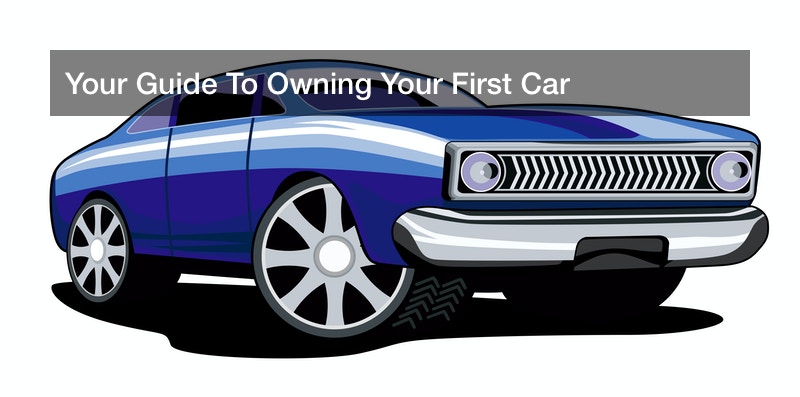Your Guide To Owning Your First Car


There’s nothing quite like the sense of freedom you experience when you get your first car. With driver’s license and keys in hand, you finally have a vehicle of your own and you can hit the open road whenever you want.
Along with that freedom, however, comes a lot of responsibility. As a new car owner, It’s up to you to keep your vehicle in tip-top shape and safe for driving. This handy first time car owner guide will help you shoulder all that responsibility that comes with owning your own wheels.
Read Your Manual
Before you put the keys in the ignition and take off on a long trip, it’s helpful to grab the owner’s manual for your car and give it a read. It’s packed full of information, not all of which will be relevant to you right away, but you’ll at least get a sense of some basic things. These include learning your car’s maintenance schedule for things like oil changes, what the different lights on your car’s control panel mean and even what kind of gas you’re supposed to put in your car.
Stay On Top Of Insurance
One of the most important tips in your first time car owner guide is to make sure you choose a good car insurance plan. Having car insurance is important because it covers things like vehicle damage or injuries in the event of a car accident. These days, you can buy car insurance online, you can buy it over the phone or you can visit a local insurance agent.
However you buy it, it’s important to get the right plan for your vehicle and this tips can help you in that endeavor:
- Know the insurance laws in your state. You want to make sure you have the right amount of coverage for the state you live in.
- Price shop to find the best quote.
- Check for discounts such as safe driving that some companies offer.
- Thinking about supplementing your car insurance. You can get additional coverage that addresses issues such as theft or vandalism as well as damage caused by flooding or hail. As a first time car owner, it might also be a good idea to get supplemental coverage that offers roadside assistance in case you get a flat tire or locked out of your car.
- Pick a deductible and a premium that you’re comfortable with paying. You can talk to an agent about what might work best and what you can afford.
Keep Up With Maintenance
One of the most essential tips in your first time car owner guide is to regularly keep up with maintenance on your car. Maintenance indeed costs money, but it’s not always a good idea to put it off. You can usually go to your local dealership and get an oil change, tire rotation, and fluid check maintenance package for around $40. Ultimately, you want to try and get as much life and value out of your car as possible and staying on top of maintenance can help you make sure that happens.

There’s no exact step-by-step process in a first time car owner guide to dealing with auto repair. Every car is different and every car owners needs are different. While one driver might go to an auto repair shop to repair a muffler, you might go the same shop for an engine repair if you notice smoke coming out of your hood or you hear strange noises when you’re driving your car.
If you do need an auto repair, don’t skimp. Auto accident injury lawyers have indicated that an auto repair can be the cause of an accident, particularly when there’s negligence involved. The best thing you can do is find reputable, licensed auto shops who have good reviews and can take care of any car repairs you need.
Keep Up With Your Auto Loans
Having insurance is an important part of the first time car owner guide, but it’s also important to keep up with your auto loans. Even if you price shopped, put money down beforehand, and have a good credit score, it’s important to keep up with the terms of your loan and to keep up payments. If you feel like your monthly payment is too much, you can always try and refinance it. A good idea is to refinance through a credit union, which typically offers lower rates.

Watch Your Driving
As a first time car owner, you’re understandably excited to pick up your friends for a day of fun and hit the road. As excited as you are, you need to be cognizant of your driving habits. You might not know it, but how you drive can have a big effect on how often you need to fill up with gas, how long your brakes stay in good condition and how much overall wear and tear you put on your car. By driving safely and at a steady pace, you’ll keep your car in good shape and reduce your chances of getting stopped by law enforcement.
Stay Focused
Perhaps no piece of advice is more important in a first time car owner guide than this: stay focused on the road. In 2019 alone, nearly 100 million Americans planned on taking a family vacation, meaning there were a lot of cars on the road. With so many cars on the road, the chances of a car accident occurring increase.
It’s estimated that more than four million people required medical attention in the aftermath of a car accident in 2019 and nearly 1.6 million crashes each year are a result of texting and driving.
As a first time car owner (and a good, responsible driver), you want to do all you can to keep yourself and others safe. You may think you’ve got everything under control, but taking your eyes off the road, even for a second, can have potentially dangerous consequences. If you need to answer a call or respond to a text, find a safe spot to pull over and do so.
Leave A Paper Trail
Whether you buy a brand new car or a series of used cars, it’s a good idea to keep any receipts you have for major repairs and routine maintenance. Eventually, you may want to trade in your car and by having a paper trail, you can easily prove that you’ve done a good job keeping your car in good shape.
Keep Your Documents Handy
As a first time car owner, you absolutely cannot forget all the important documentation you must have in your car. You can keep your car-repair receipts, but you’re also going to need a copy of your vehicle registration as well as an insurance card. In the event of an accident or getting pulled over, you need to be able to present this information to the proper authorities.
Consider Joining A Car Club
Car clubs or motor clubs, like AAA, are a great thing to have as a first time car owner. Motor clubs usually offer round-the-clock roadside assistance that includes lockouts and needing to get towed. As an added bonus, motor clubs also offer discounts for members, so you may be able to save some money on things like rental cars or even hotels the next time you take a vacation.

Get A Car Wash
In the grand scheme of things, getting a car wash probably ranks low in the first time car owner guide, but it’s still important. Regular car washes keep your car clean, but they also protect your vehicle’s integrity. You may not know it, but dirt and other debris can eat away at the protective coating that protects your car from rusting. Most car washes offer all kinds of packages, so you can get whatever you like to clean your car.
So if you happen to drive down dirt roads or roads with uneven paving, such as gravel roads during a cross country trip, stop into a car wash and get your car clean.
Get Comfortable On The Road
If staying focused on the road is tip No. 1 in a first time car owner guide, getting comfortable on the road might be No. 2. As a first time car owner, you may be excited to get your own car, but you might not always feel comfortable driving it.
Confidence comes with time and not all drives are created equal. After all, a drive on country roads is a lot different than dealing with city freeways during morning rush hour. Building up your confidence can help you enjoy your new car a lot more and you can gain confidence in many ways:
- Practice: the more you’re on the road, the more experience you’re going to gain. Try short drives and gradually work your way up.
- Plan your route: As a first time car owner, there’s nothing worse than getting lost. There’s no doubt GPS and navigation apps have made driving easier, but it’s helpful (especially if you’re a new driver) to turn the phone off and navigate the old-fashioned way. By paying attention to road signs, you’ll easily learn how to get where you need to go and learn alternate routes for how to get there.
- Know your car: In a first time car owner guide, knowing what your car does is important. Learn what all your buttons do, know where your hazard lights are, know how to use your windshield wipers and familiarize yourself with what all the symbols on your control panel mean.
- Venture out: First time car owners can feel nervous with passengers in the car, so it’s a good idea to get out on your own. Pick a day and a time and force yourself to drive there. You’ll learn where it is and gain confidence too.
- Focus on you: On a busy highway or city street, it’s easy to feel overwhelmed by the other drivers on the road. The best thing you can do is focus on yourself and don’t let yourself be intimidated by someone else.
Dealing With Accidents
No matter how safe you are or what you’re driving, accidents are going to happen. No one gets in an accident on purpose—that’s why they’re called accidents—but it’s important to know what to do if you’re involved in one.
- Move: If you can safely move your car away from the accident scene, do it. If you can’t, flip on your hazard lights to alert other drivers.
- Stop: Once you’ve moved your car, turn it off. Make sure you can safely get out of your car and do so.
- Help out: You’ll need to check on anyone else involved in the accident, including passengers, other drivers, or even pedestrians. Call 911 to have everyone checked out.
- Call the police: Even for seemingly minor accidents, you’re probably going to need a police report, especially for insurance purposes. You need to cooperate with police, but avoid admitting fault or blaming someone else for the accident.
- Get info: In the aftermath of an accident, you’ll need to get as much information as possible. If your accident requires further legal action and a car accidents attorney are involved, you’ll want all the necessary information including insurance, vehicle information, contact information for witnesses and the location of the accident.
No one wants to get in car accidents, but they do happen. By keeping calm, cooperating with police and gathering necessary information, you can make the aftermath a lot easier to deal with.

Driving can be fun, driving can be relaxing and as a first time car owner, you should take plenty of time to enjoy your new ride. But by driving safely, keeping up with maintenance, and following other tips in the first time car owner guide, you can enjoy your car and keep it in ship shape. By staying safe, you’ll gain more confidence on the road and take your car from your busy city streets to scenic highways on an exciting vacation trip.







